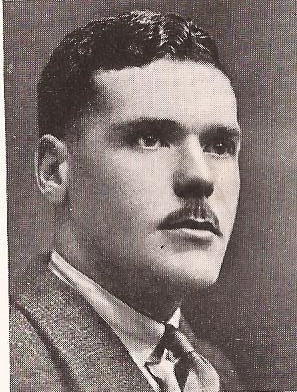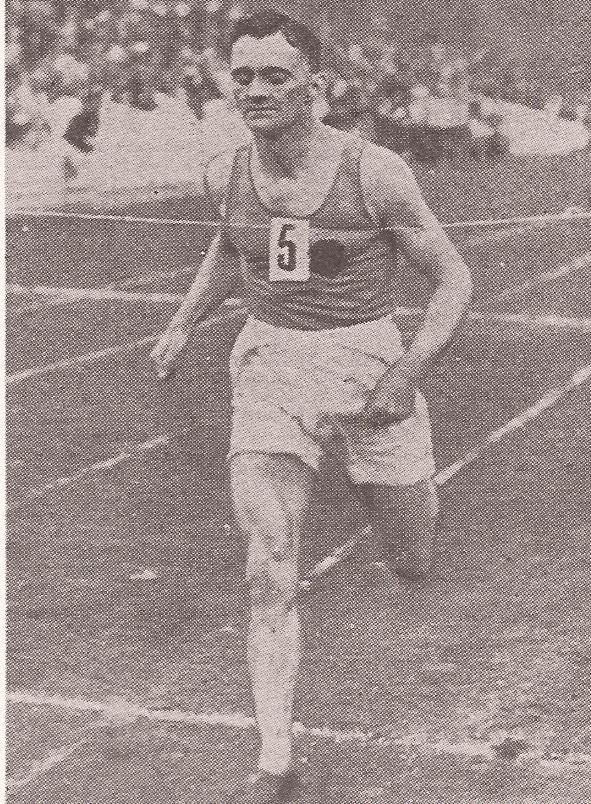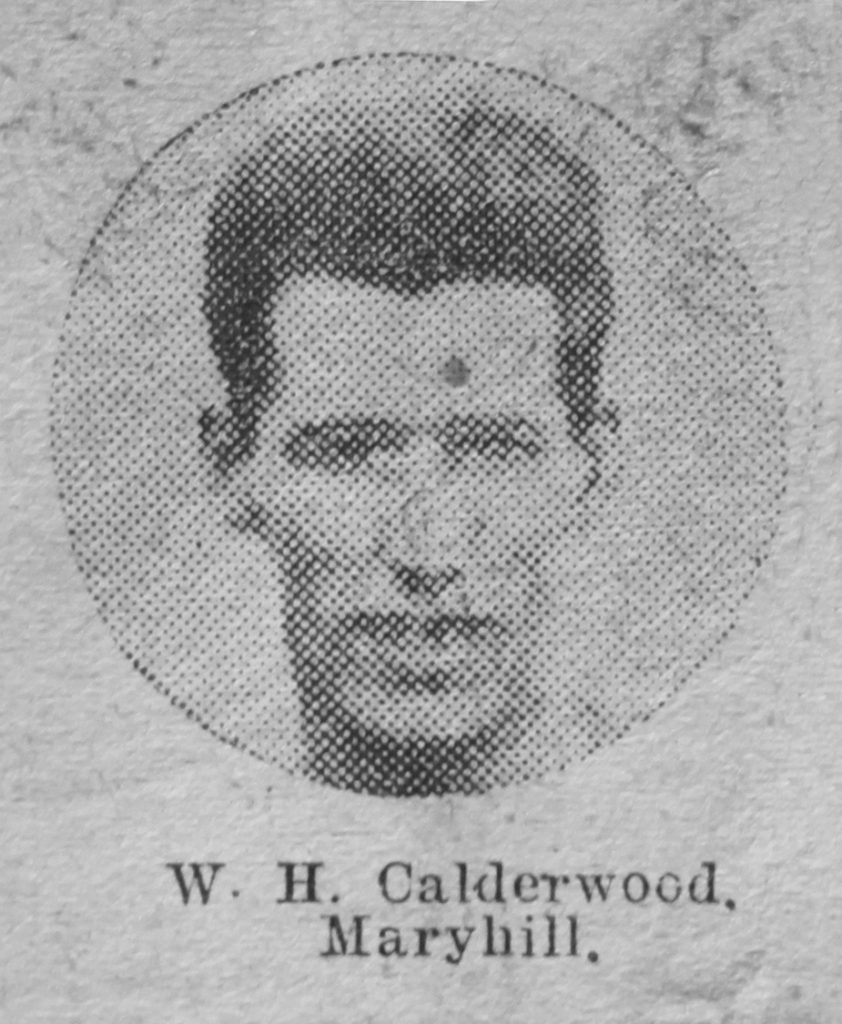Tom Riddell, Shettleston
Maryhill and Edinburgh University AC might have swapped the title for the first 11 years of its running, but they were only to win it once each in the ten years from 1930 to the outbreak of war in 1939.
The SAAA championships were held on the last Saturday in June but one week earlier, on 20th June 1930, there was an invitation relay at the Glasgow Police Sports at Ibrox which gave the main contenders a chance to test their team against the opposition. Glasgow University, Maryhill Harriers, Shettleston Harriers and Edinburgh Harriers were all n the starting line, and all had their top men out. The race went to Glasgow University whose team of N Morison, JL Smith, R Murdoch and I Borland was too good for their Edinburgh equivalents, represented by HC Maingay, RA Howson, FP Reid and GM Wells, winning by five yards in 3 minutes 39 3/5th seconds. Maryhill Harriers were third. The headline on the article reporting the race was “Borland’s Great Effort in Relay Race”, and the report said:
“The best running of Crawford and Borland on Saturday was accomplished in the mile relay race, one of the most interesting events, by the way, of the season. Crawford, running one of the furlongs for Shettleston, exhibited all his wonted smoothness of action, and he was much better here than in his heat in the sprint where he appeared to have some trouble opening up. The intervening week however should see him properly tuned up for the Championships.
The disappointment of the race was HC Maingay. Either he was under form or he under estimated the finishing powers of J Hood, the Shettleston runner, for he was content to remain in the ruck until the finishing straight, and when he did go out he was unable to peg back Hood’s lead, being beaten by almost five yards. Maingay’s big swinging stride demands plenty of room, and had he gone into the lead right away there would have been a different story to tell. He was obviously cramped, moving away from the head of his field. Hood’s time for the half mile was 2 min 2 sec, and only last week at the St Peter’s meeting Maingay was returned as doing 1 min 55 1/5th sec. The Glasgow University’s winning time was 3 min 38 3/5th sec – 1 3/5th sec outside the record created by Edinburgh University at the same meeting last year.”
The same four clubs contested the national championships but with a much different result. Shettleston switched Hood from the 880y opening stage to the 440y last leg, and ran Tom Riddell on the first stage against Maingay and Calderwood. Maingay had won the half mile but on the half mile leg of the medley relay he had to give best to Riddell and Shettleston went on to win the event for the first time and break the duopoly of Edinburgh UAC and Maryhill Harriers. They won by 12 yards in a time of 3 minutes 45 seconds from Edinburgh with Maryhill third and Glasgow University fourth.
The Police Sports in 1931, held on 20th June at Ibrox before a crowd of 15000 spectators, again held an invitation relay in which the Maryhill Harriers team of Calderwood, Hamilton, Turner and P Dolan won by 20 yards from Shettleston Harriers, Glasgow University and Dublin Metropolitan Guards in a time of 3 minutes 40 seconds. Came the championship the following week and there were some significant changes in personnel. Maryhill ran D McBride in place of Hamilton, and Shettleston ran sprinter Crawford who hadn’t run the week before, and J Hood, who had won the half mile, on the 440 yards leg of the relay. Going in to the race, Tom Riddell had won the mile easily (by 30 yards) and James Hood had won the half mile by inches from Wells (EUAC) and Calderwood. The Glasgow Herald report read:
“James Crawford did not defend his title in the 100 yards, but he turned out for Shettleston in the relay. He was obviously far from his best, but with Riddell returning 2 min 1 3-5th sec in the half mile sector, and Hood running the quarter in 52 sec, the champions stalled off Maryhill’s challenge. This was one of the best relay races seen in the championships, the margin between the two teams never large, and the issue in doubt until the last few yards. The time – 3 min 40 1-5th sec – has only once been bettered in the championships, and that by Edinburgh University in 1922.”
R Graham
In 1932 the report on the Glasgow Police Sports at Ibrox on 18th June began
“If it were for nothing else than the fact that it produced the finest relay race seen in Scotland for many years, the Glasgow Police meeting held on Saturday must be written down as one of the most successful in a long series extending back for almost half a century. It is a coincidence that the existing native relay record of 3 min 37 sec was made by the Edinburgh University team at the same meeting three years ago and that new figures should have been set up at the Police meeting again and also by a students team, this time from Glasgow. There was some criticism on the last occasion of admitting the Edinburgh performance as a native record on the grounds that RL Howland, an Englishman, was a member of the team. There can be none this time, for N Morison, M Stone, I Murdoch and IM Borland , the winning quartette on Saturday, are all Scottish born.
“After the opening half mile sector of the race, a new record was always in prospect, and it was no surprise that the time, 3 min 34 3-5th sec, 2 2-5th sec faster than the old time, was announced. This represented excellent racing on the part of all four students, and also by all four Maryhill men, as the national champions finished only inches behind the winners and well inside the record also. Figures on the record book are there, they say, for all to read, but what will matter to Saturday’s twenty thousand spectators is not so much the time, excellent though it is, but the memory of a magnificent race by both teams redolent of the highest courage.
“So evenly were both teams matched that the decision was in doubt from the time the half=milers started racing seriously, 300 yards from the first changeover, until the tape was broken. Where all did well it is possibly dangerous to to select individuals for special mention, but it is an undoubted fact that the two men who contributed most to the excellence of the race as a spectacle were Neil Morison in the half mile and FW Brown in the quarter. Morison has been well known as a miler for the past few seasons, and has recorded many good performances over that distance, but few, even among his Westerlands admirers realised that he could get the half mile under even time as he did on Saturday. Nor was it expected of Brown, already regarded as a sprinter, would concede Ian Borland three yards over a quarter and come very near to springing the surprise of the season. Yet both things happened with the result that the race was intensely exciting.”
What a build up to the SAAA Championship the following Saturday! The facts of the result:
1, Glasgow University (Morison, Stone, Murdoch and Borland) 2. Maryhill Harriers (Calderwood, McBride, Turner and Brown) 3. Springburn Harriers
In the championships, an experimental holding of the heats for the sprints on the Friday night was declared a great success and the racing in the short sprints of the highest quality – but there was no reporting of the relay with only the result being given. This was possibly because of the absence of a strong Glasgow University team despite the fact that all of their men from the previous week were competing. In their absence, Maryhill Harriers won with a team of Calderwood, McBride, Hamilton and Brown in a time of 3 min 37 sec. Second was Shettleston Harriers (Riddell, Kennedly, McLaughlin and Buchan) and third Springburn Harriers (Scott, Carson, McKee and Keill). A very weak Glasgow University team was noted as having ‘also competed’. This was Maryhill Harriers’ sixth victory in the event.
*
In 1933 the Glasgow Herald report on the Police Sports Meeting was headlined ‘EXCITING RELAY AT POLICE SPORTS MEETING’. 15,000 spectators were present on what was described as a cold, blustery windy day with showers of rain to see what was a good day’s athletics. The report on the medley relay went on –
“The outstanding feature of the afternoon, as last year, was the Mile Relay and although the time recorded by the Glasgow Police team was slower than the record of 3 min 34 3-5th sec set up by Glasgow University a year ago, conditions were much worse on Saturday. As a race it was the keenest relay seen on a Scottish track for many years, and the three teams that finished first, second and third were so evenly balanced that interest was maintained from the pistol to the tape. Each of the three teams led in turn, Glasgow Police at the first changeover, Maryhill at the end of the first quarter, Glasgow University at the final change over and the Police came in again at the finish to win by a bare two yards from the students.
“In the half-mile sector run in 2 min 3 sec J Scott had the measure of WH Calderwood who has yet to find his best form. The furlongs provided some good running. AD Turner and Robin Murdoch ran impressively. Murdoch, called upon to concede PW Brown three yards, overhauled his man and led him a yard at the change over. SE McKinnon, the ex-Shettleston man now with the Police, also ran excellently against the wind and it was this that gave R Davie his chance in the quarter mile.
Davie is running better than ever and much more consistently, and on this showing must possess an excellent chance of winning over this distance at the Scottish championships. He defeated both NM Glen, the inter-University champion, and R Graham after being behind at the final change over. He was unofficially timed as being slightly under 50 sec. Glen ran a good race but despite the fact that he spiked himself at the first bend, a wound that necessitated three stitches when he went to the Western Infirmary afterwards for treatment. The toll that his recent operation has taken on his strength was noticeable in R Graham’s running. He was with Davie and Glen until 200 yards from the tape but failed to last home.”
The result 1. Glasgow Police (J Scott, M Shaw, SE McKinnon and R Davie) 3 min 40 1-5th sec; 2. Glasgow University (N Morison, I Borland, R Murdoch and NM Glen); 3. Maryhill Harriers (WH Calderwood, AD Turner, PW Brown and R Graham). Won by two yards.
Edinburgh University AC won the SAAA Championships in 3 min 37 2-5th sec. It is a bit ironic that at a time when the public were avid relay enthusiasts and when the events were hotly contested by the clubs, the national championships were scantily reported upon. In 1933 neither the Glasgow Herald nor the Scotsman reported this event at the championships and we have only the results available. These are as follows:
- Edinburgh University AC GA Smith, SE Martin, RA Howieson, RB Wylde 3 min 37 2-5th sec Won by three yards
- Shettleston Harriers TM Riddell, J McRoberts, W Kennedy, J Hood
- Glasgow Police AC J Scott, M Shaw, E McKinnon, R Davie
Maryhill Harriers, the holders did not compete.


